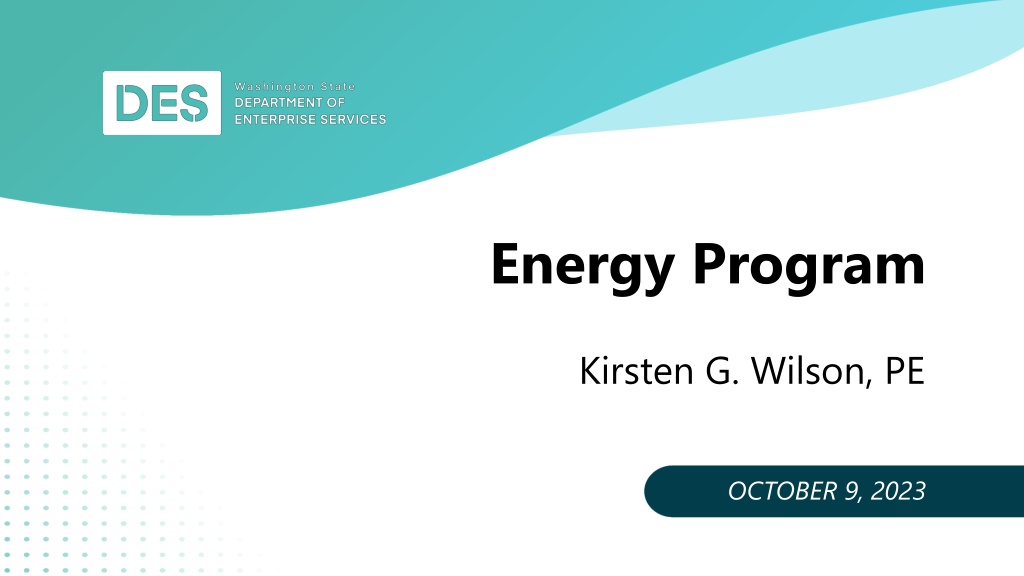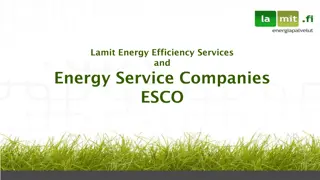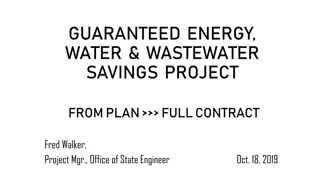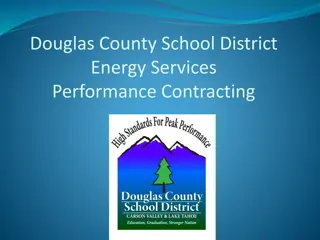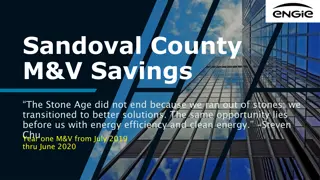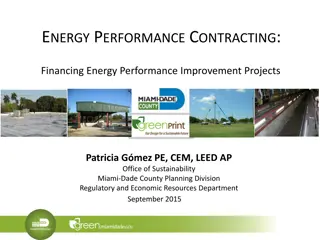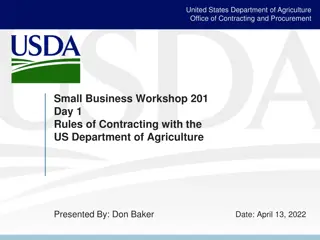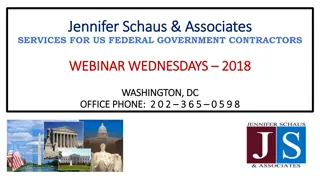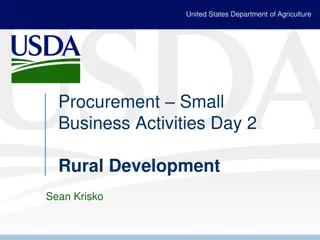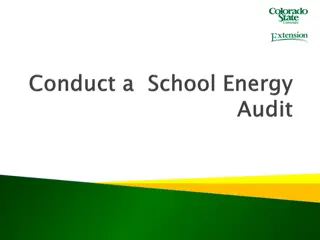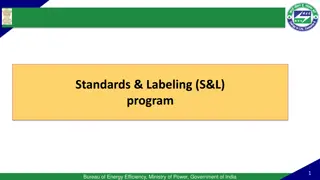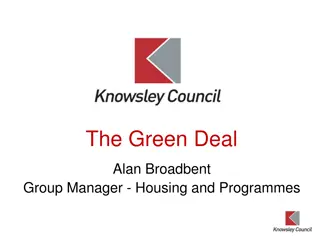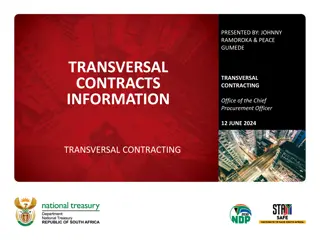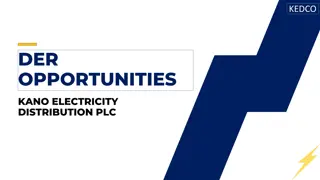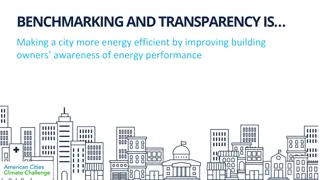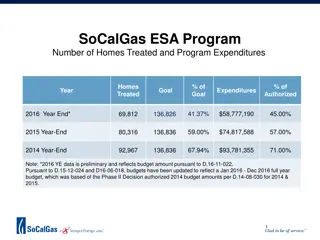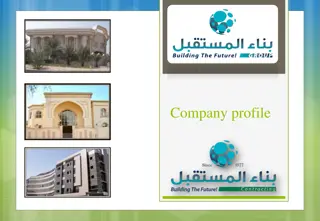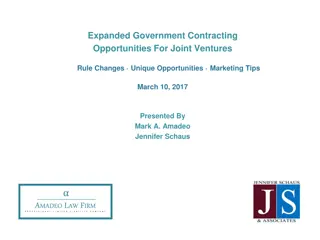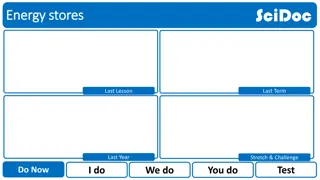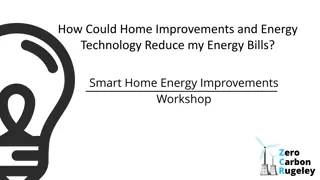Understanding Energy Savings Performance Contracting (ESPC) and ESCOs
Energy Program by Kirsten G. Wilson, PE covers topics like ESPC, Energy as a Service, decarbonization plans, and more. Explains ESPC as a collaborative process for achieving energy savings. Discusses the role of DES in project oversight. Details the role of Energy Service Companies (ESCOs) in energy efficiency projects. Lists qualifying projects and outlines the sequence of an ESCO project.
Download Presentation

Please find below an Image/Link to download the presentation.
The content on the website is provided AS IS for your information and personal use only. It may not be sold, licensed, or shared on other websites without obtaining consent from the author. Download presentation by click this link. If you encounter any issues during the download, it is possible that the publisher has removed the file from their server.
E N D
Presentation Transcript
Energy Program Kirsten G. Wilson, PE OCTOBER 9, 2023
TOPICS BEING COVERED Overview of ESPC Energy Program Summary of EaaS Decarbonization Plans (HB 1390) CBA Compliance Assistance RCM Pilot Project PM role ESCO role Types of projects Process overview
WHAT IS ESPC Energy Savings Performance Contracting (ESPC) Emphasizes achievement of energy savings Fully Fully Provides guarantees collaborative process negotiable process
WHAT IS THE ROLE OF DES? 1986 RCW 39.35 A and C: Legislative Authority to DES Prequalified Providers Project Oversight Contractual Framework & Coordination Financial Transparency
ENERGY SERVICE COMPANY ROLE Energy Services Company (ESCO) Some similarities to a Design/Build firm Turnkey service for energy efficiency projects Expertise in energy engineering Commissions project work Measures and verifies energy savings
QUALIFYING PROJECTS Conservation projects resulting in cost savings or benefits: Motor and pumping systems Energy efficient lighting retrofits High efficiency HVAC systems Boiler and chiller systems Solar, wind and co-generation Water and Wastewater Treatment Plants Demand response & grid resiliency Water efficiency projects EV charging Submetering
SEQUENCE OF AN ESCO PROJECT Initiate Interagency Agreement Preliminary Audit Design & Construction ESCO Selection Investment Grade Audit Measurement & Verification
1: INTERAGENCY AGREEMENT DES management fee schedule is included in the IAA The Client signs and DES executes the IAA DES initiates an Interagency Agreement (IAA) between the State and the client agency
2: ESCO SELECTION The client reviews qualifications and chooses the ESCO that is right for them ESCO Interviews are optional DES pre-qualifies Energy Service Companies (ESCOs) every biennium and creates a registry through an RFQ
3: PRELIMINARY AUDIT Walkthrough to identify facilities and systems to study Project team determines desired project outcomes Client establishes cost-effectiveness criteria ESCO provides preliminary audit results Project team review list of energy efficiency measures proposed
4: INVESTMENT GRADE AUDIT & ESP ESCO and DES sign investment grade audit agreement, Client signs funding authorization. ESCO conducts detailed site investigation, energy analysis, and cost estimation of proposed scope. Client may identify preferred subs and equipment. IGA report delivered identifying energy savings and costing for each measure investigated. Energy Services Proposal (ESP) outlines scope, guaranteed savings, detailed budget, guaranteed costs, schedule etc. for measures agreed to. Client and DES review energy services proposal. ESP is basis for construction contract set.
5: DESIGN AND CONSTRUCTION ESCO and DES sign construction contract set Client signs funding authorization and IAA amendment DES issues notice to proceed to ESCO Client and DES review design documents Project documents prepared by ESCO Sub-contractors and equipment selected DES PMs provide management and review of construction meetings, invoicing, change orders, substantial completion/commencement of energy savings, closeout, NOC, intents, affidavits, apprenticeship, etc.
6: MEASUREMENT AND VERIFICATION First year measurement and verification (M&V) is part of every project. ESCO to provide report. Longer term of M&V is recommended for systems which require frequent adjustments, such as controls systems.
ENERGY AS A SERVICE Ownership and maintenance of equipment is by the SPE after construction Follows same pathway of ESPC currently used through construction Requires an agreement signed by Client and the SPE Project funding is through a special purpose entity (SPE)
DECARBONIZATION PLANS Only applies to campus with a district energy system(s) serving 5 or more buildings and at least 100k sf Allows for 15-year time horizon to implement energy efficiency and decarbonize campus facilities Must be approved by Commerce Updated every 5 years Provides compliance pathway for CBA
CBA COMPLIANCE ASSISTANCE ESCOs are required to validate ESPM data and determine EUIt ESCO assists in developing energy management and O&M plans ESCO staff meet qualification requirements for auditing DES Energy requires Level 2 audits
RCM PILOT Pilot participant: Renton Technical College Number of target buildings: 2 RCM site visits RCM staff interviews Opportunities Identified
THANK YOU kirsten.Wilson@des.wa.gov 509.370.0216 des.wa.gov/energy-program
